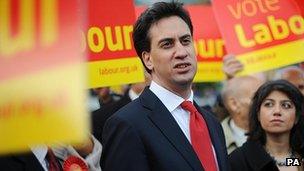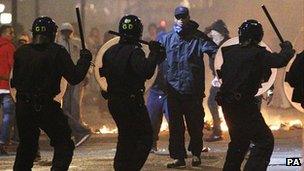Booktalk: The political books of 2011
- Published
- comments
One of the things you learn presenting BBC Parliament's Booktalk is that there is a distinct cycle dictating the kind of political books which appear.
For example, in the wake of a general election there are politicians, or ex-politicians, with time on their hands and records to justify - or agendas to pursue.
So 2010 saw a spate of New Labour memoirs, each with its acid accounts of internal infighting, demonstrating that while revenge may be a dish that is best served cold, it is often best produced in the white heat of indignation.
But in 2011, the cycle turned and we began to see books about the state of politics in general, about the rise of our new leaders and about the ideas they are - or ought to be - selling to the electorate.
Which brings me to Mehdi Hassan and James MacIntyre's Ed: The Milibands and the Making of a Labour Leader.
In a way, this biography of the surprise leader of the opposition straddles my literary cycle.
There is plenty about the psychodrama of the Blair-Brown years and about the intellectual hothouse in which he spent his childhood.
His father was the Marxist guru Ralph Miliband and when your childhood includes regular dinners with the likes of Tariq Ali, political debate will clearly hold no terrors. We chart his rise through student politics to the inner sanctum of Gordon Brown, to the cabinet and now to the leadership of his party.
Of course, it's an incomplete story - an interim life.

A biography of Ed Miliband charts his rise from student politics to Labour leader
But the tale it tells of a young-ish politician's career is mirrored in the similar lives of David Cameron and Nick Clegg. It is a smooth, almost enchanted progress - on the back of talent and patronage - from acolyte to leader.
Almost unintentionally, this is as much a portrait of the political class in the 21st Century as a biography of Ed.
Fantastically revealing
Many of the same comments could be applied to another biography of a former special advisor who's now risen to eminent office. Bercow - Rowdy Living in the Tory Party, by Bobby Friedman.
It's a compelling portrait of a political loner who seized his moment and became Mr Speaker Bercow.
Friedman traces his career from the wilder fringes of Conservative youth politics into the blue-chip Buckingham seat, and thence into Parliament.
Normally the Speaker is a consummate parliamentary old hand - marinated in the traditions of the House, a respected tribal elder. John Bercow is virtually the opposite of that; a tradition-busting moderniser, a niche taste within his own party.
He has always been willing to step into controversy - and has occasionally been dragged into it. And Friedman's biography is an essential guide to understanding the man at the fulcrum of parliamentary democracy today.
A slightly less cyclical offering is the final volume of Chris Mullin's parliamentary diaries - A Walk-on Part. Although this is the third volume to appear, it's the first, chronologically speaking, starting with Mullin's reaction to the death, in 1994, of Labour's then leader, John Smith.
There's a fantastically revealing exchange with a backbench colleague, Alice Mahon, who announces she is against Tony Blair at all costs. Mullin retorts: "I'm for winning the next election at all costs."
This is the tale of a backbench MP who pursues causes and scrutinises government in exactly the way the constitutional textbooks say a parliamentarian should - with scepticism, energy and persistence.
Anyone who plans on a parliamentary career should study Mullin's account of the many frustrations and few triumphs that await them.
Reaction to riots
David Lammy's new book, Out of the Ashes - Britain After the Riots, is partly the product of that political-literary cycle, and partly of events - events that started in his Tottenham constituency - which provided the flashpoint for the summer riots.
Lammy is no longer a minister and has not been made a shadow minister. His book, which started life as a reflection on working class, inner city disaffection, and on Labour's defeat, became an intensely personal account of his early life in Tottenham and an acute study of the roots of the riots.

In his book, David Lammy tries to make sense of what sparked the disturbances in his constituency
Lammy traces the tangle of economic changes and government policies behind the culture which produced the riots - council house sales, the decline of skilled working class jobs, consumerism and a lack of male role models are all listed as factors behind the rise of gang culture.
He is fascinating about the ritual of community protest outside the local police station - and about the failure of police tactics when the riots erupted. And his prescription, for policies aimed at building stronger communities, is something of which much more will be heard. This is one of the best political books of 2012.
The last few elections have been followed by a study of what really happened by the patriarch of polling, Sir Robert Worcester of Ipsos-MORI.
This year he had to explain one of the great mysteries of politics. Faced with a deeply unpopular prime minister, a government riven by plots and intrigue, and the worst economic climate since the late 1940s, how on earth did David Cameron fail to win the 2010 general election?
Cameron's coalition
The result is Explaining Cameron's Coalition, co-authored with polling consultant Mark Gill, which dissects both the election campaign and the political climate in which it took place, with the aid of detailed opinion polling.
They debunk myths about the significance of the Rochdale "Bigotgate" incident, and even of the first ever TV debates between the party leaders - and concentrate on long-term trends which had been accumulating for years before the election was called.
Apart from anything else, it's a sobering read for journalists caught up in the daily frenzy of the campaign trail.
Of course, some of the current crop of political books stand outside the cycle.
One of the most interesting is Michael Macmanus's Tory Pride and Prejudice: The Conservative Party and homosexual law reform.
Mr Macmanus, a former ministerial adviser, traces the Conservatives' changing attitudes from the anti-gay crusading of 1950s home secretary David Maxwell Fyfe to an era when a Conservative prime minister can support gay marriage at his party conference and win a round of applause.
This is a very parliamentary book - delving as it does into committee-stage debates on doomed reform bills and the deliberations of tiny campaign groups.
One of the most striking points is that many gay MPs told him they are now much happier, and better politicians, because exposure of their private lives can no longer end their career in humiliation.
Political terrier
2011 has also seen some wonderful new biographies.
John Bew's Castlereagh and David Brown's Palmerston are monumental looks at the careers of two 19th century titans.
But my offering is a little more niche. Matt Cole's Richard Wainwright, the Liberals and Liberal Democrats: Unfinished Business, is an account of the life and influence of a Liberal patriarch - one of the handful of MPs who kept the party of Gladstone going until its great revival and reincarnation in the 1980s.
Wainwright was difficult and hard to work with. There seemed to be a formal moment every few years in the 1960s, 70s and 80s, in which he would declare that the incumbent Liberal leader was betraying the party.
Some of the correspondence with David Steel quoted in this book certainly suggests he could provoke extreme irritation.
But at the same time he was one of the tiny political cadre that kept a party alive, and inspired followers to join it. Cole's book is a suitable memorial to an unappreciated political terrier.